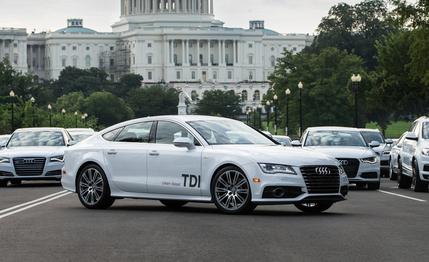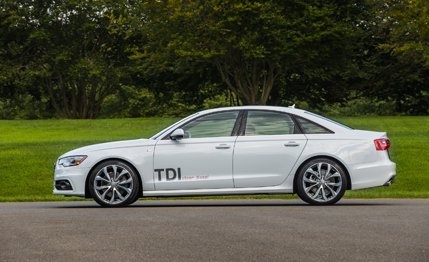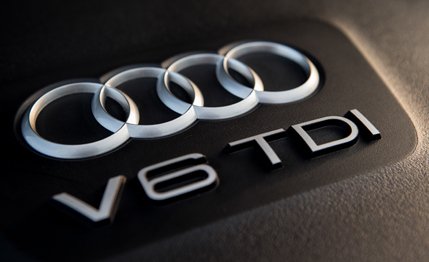
 First Drive Review
First Drive Review
The world’s automakers are finally ready to make the diesel work in the U.S. Or maybe it’s more accurate to say the world’s automakers need the diesel to work in America. As fuel-economy requirements escalate, diesels have become a viable panacea to afford Americans their full-size cars and trucks while fulfilling the government’s mandate. Nissan, Jeep, Ram, Chevrolet, and Mazda are joining the modern diesel era, and the Germans—no strangers to exporting their oil burners to U.S. shores—are eager to strike while the glow plugs are hot. Audi has four new diesel models for 2014, mostly versions of the automaker’s largest vehicles that share the Q7’s diesel V-6. But bringing these cars to the U.S. isn’t as simple as fitting a new engine under the hood. In the 2014 Audi A6 TDI and A7 TDI, the diesel has to be reconciled with the cars’ athletic nature.


One Diesel to Do It All
U.S. diesel options are increasing, but there’s still a long way to go before our market is as varied as Europe’s, where the A6 and the A7 are available with a choice of three diesel engines. Here in the Sates, the TDI comes in one spec: a single-turbo 3.0-liter V-6 making 240 horsepower and 428 lb-ft of torque. Audi has fitted the U.S. car with a slightly smaller compressor than the one in the comparable European model to tweak the power curve, sacrificing autobahn power on the top end for low-end responsiveness. It appears to have been a smart move, as the A6 TDI steps off the line smoothly and quickly, with noticeably quicker reactions than those of Mercedes’ six-cylinder diesel. Strong power and assertive torque are your friends throughout the 4600-rpm tach sweep, but at part throttle, the eight-speed can be too eager to upshift, choosing the next gear 500 rpm earlier than you might want. Audi claims the TDI is merely 0.2 second behind the supercharged gas V-6 in the run to 60 mph. We predict the gap will be slightly larger, but the TDI should still be capable of a sub-six-second time.
These diesel mid-sizers are quick enough to make you wonder whether a six-cylinder is overkill. Mercedes-Benz is in the process of launching a four-cylinder diesel in its GLK small crossover and E-class mid-size sedan, but if Audi is at a disadvantage, it doesn’t show significantly in the fuel-economy numbers. The EPA rates the TDI versions of the A6 and A7 at 24/38 mpg city/highway, and after back-road stints through Virginia and Maryland, the in-car trip computers reported seriously impressive fuel sipping: 35 mpg in the A6 and 34 mpg in the A7. Both cars are helped by a standard engine stop-start system that can be alternately discreet and abrupt. At least the engine’s audio track is subdued. At idle, the diesel’s signature is a subtle, low vibrato, and the din from underhood is imperceptible when cruising above 30 mph. Diesel clatter is only apparent when you’re standing next to an idling TDI or driving with the windows down.
Beyond the engine, the TDI versions of the (10Best-winning) A6 and A7 are the same as the gas-fueled Audis we’ve come to know and love. They offer the same meticulous cabins and upscale features, the only difference being a tachometer that tops out almost 2000 rpm lower. These cars also hang onto their status as benchmarks for chassis performance. Both cars deliver admirable ride quality and excellent dynamics, in part thanks to the optional 19-inch wheels wrapped in Pirelli P Zero tires.


Of Politics and Price Premiums
No matter how good the cars are, any automaker faces serious resistance in making diesel models anything more than a niche play in the American market. Lobbyists from the German car companies are keen to “level the playing field” between diesels and their gas-electric rivals. They’d like to see incentives like tax credits and carpool-lane access, or at the very least, a lower diesel tax that is on par with that levied on gasoline. But in this political and fiscal climate, their best hope is seeing the gas tax raised. As it stands now, diesel remains a long-term investment for any buyer. The TDI engine carries a $2400 premium and is only offered in the top two trims. With premium gas at, say, $3.79 per gallon and diesel at $3.87 per gallon, it would take about 60,000 miles to earn back the investment in the pricier diesel car.
We like diesels. We like the big torque and the excellent real-world fuel economy. But the notion that anyone is buying a $60,000 sedan with a heavy environmental conscience or a pragmatic economic analysis is a stretch. Performance sells cars in this price range. As civilized and torquey as it is, the TDI engine doesn’t have the immediacy of the gas-fueled, supercharged V-6, an engine that sets an industry standard for its instant throttle response, supreme linearity, and excellent power delivery. Paying more money for fewer thrills doesn’t make much sense here.